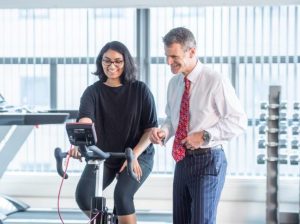Professor Middleton, Head of ORI, was part of the group of experts that was asked to research and then draw up the guidelines for the treatment of Osteoarthritis for the NHS. As part of the National Institute of Clinical Excellence [NICE] these guidelines were updated in 2022.
The three key recommendations are:
- Education
- Weight loss
- Exercise
Education is important to develop an understanding about osteoarthritis. It is not a dangerous disease, like an infection or cancer, in that it doesn’t affect the length of your life. It is a degenerative condition that gets worse over time and affects the quality of your life due to worsening pain, stiffness and function. It can be painful with activity but also at night whilst trying to sleep. Your hip can become stiff making it difficult to get in and out of a car or put shoes and socks on.
Your weight makes a big difference to the load you put through your hip when you move. When walking you may be putting 4-5 times your body weight through your hip with each step. Using a stick can help but the best way to improve things is by losing weight. If you’re overweight and lose some extra pounds your pain may reduce or even go away.
Exercise is good for your hip. If you develop osteoarthritis, the worst thing you can do is become inactive. A sedentary lifestyle will lead to muscle wastage around the hip, causing increased stiffness, muscle weakness, pain and disability. It should be considered that the wrong type of exercise can aggravate your symptoms. Therefore, running, jumping, heavy lifting and manual work should be avoided. Low impact exercise, such as swimming, yoga, Pilates and Nordic pole walking will be the most beneficial. The most effective exercise is cycling, ideally on a static gym bike or on the road.






